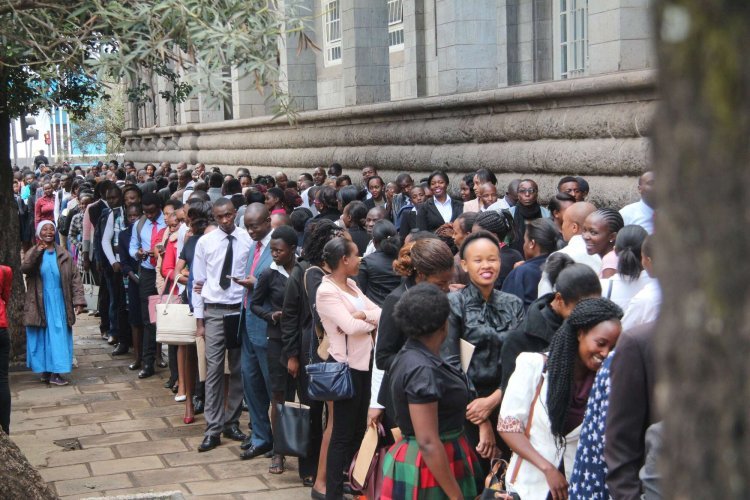Eve Maina: Businesswoman's Viral Advice On Kenyans Seeking Greener Pastures Abroad
The similarities in both her tweets were that they drew mixed reactions; those in support of her remarks and those opposing them with the belief that life is better in Kenya compared to in other countries.

Eve Maina is a young Kenyan entrepreneur who is the founder of Shoe Space Africa, a business that imports and distributes shoes both wholesale and retail with the aim of bringing high-end shoe production to Kenya and providing employment for Kenyans.
On Twitter, she is among Kenyans who have been going viral for hard-hitting statements, including one on Monday, June 26 advising her fellow countrypeople to seek better opportunities abroad.
She believed that her peers under the age of 30 have the best chance of leaving Kenya for a period of time to grow themselves in terms of career and individually in other countries with better-developed systems, noting that it would be harder to build themselves on home soil owing to the current and torrid state of the economy.
"I said this and I will say it again, if you are below 30, trying to build yourself up, leave this country.

A portrait of businesswoman Eve Maina. /FACEBOOK.EVE MAINA
"Go work hard, invest back here and come back. Kama haukujijenga era ya Uhuru, sai itakua 100x harder (if you did not build yourself during the Uhuru era, it will be 100 times harder)," she tweeted.
Two months ago, on Wednesday, April 26, Maina had urged Kenyans without families tying them down to leave the country for better opportunities, acknowledging that despite the difficulties, they would be in a better place than their peers back home.
"If you have not yet started a family, take the slightest chance you get to leave this country and go build your life somewhere else, and come back after 10 -15 years.
"It will not be easy but you will be better off than the majority of people here. We have no country here," she wrote at the time.
The similarities in both her tweets were that they drew mixed reactions; those in support of her remarks and those opposing them with the belief that life is better in Kenya compared to in other countries.
"Stop selling fear. That’s pedestrian thinking. First, how many under 30yr olds do you know who can leave to get greener pastures? Do you know the process? Is the greener pasture guaranteed? Tell people to get out of their spaces and do all they gotta do to put food on the table. Tell those who can to upskill. Tell the others to increase pockets of income if they can.
"Above all call on government and your leaders to provide an environment for our youths to thrive. Tell them to empower their citizens and not just be tumbocrats. Saying we leave is like running away from the real problem. How will you even invest in a broken system?" Phannie Kwegah posed.
To which Maina replied "Feel free to sell hope on your page darling. Here, we look at the chess board and go with the best possible move."
Another user however argued that there was no age limit as to who was allowed to leave the country, citing instances where 40-year-olds have moved abroad and witnessed a change in their lives.
"Yes, there is no age limit. But older guys find it hard to leave because they have families and have already built over half their lives here," she responded.
Ruto's Deals With Countries To Create Jobs Abroad
Coincidentally, Maina's statements align with the push by President William Ruto's government for the creation of job opportunities for Kenyans to end soaring unemployment rates through ongoing bilateral talks with foreign nations to agree on labour agreements for Kenyans working in all professions including university graduates.
"We are in talks with Germany, USA, Canada, and UAE region and they have asked us to give them young people who will go and work there.
"We are planning bilateral labour agreements. We want to agree on how much our young people will be paid when they arrive there we don't want them to suffer," he revealed on Sunday, June 25 during a church service in Kajiado.
He mandated the State Department of Diaspora Affairs to spearhead the channelling of employment avenues to Kenyans in foreign nations.
State Of Employment In Kenya
A recent report by the Kenya National Bureau of Statistics (KNBS) revealed that around two-thirds of jobless Kenyans gave up looking for work or starting businesses, disheartened by lower opportunities in a tough economy that has seen many firms freeze hiring to survive.
The data covering the quarter that ended December 2022 showed that 2.01 million out of the total of 2.97 million jobless Kenyans aged between 15 and 64 who qualify for the labour force were not actively looking for employment.
The number of graduates or retrenched workers who have given up looking for work increased from 1.33 million in the quarter to June 2020 when businesses shed jobs and froze hiring at the peak of COVID-19 economic hardships. They accounted for 67.71 per cent of the people without jobs, from 65.08 per cent in September and 54.1 per cent in June 2020.

Job seekers queuing for interviews in Nairobi. /THE EAST AFRICAN
The majority of those who gave up on employment are aged between 20 and 24, followed by 25 to 29-year-olds. The 20-24-year-old demographic consists mostly of fresh graduates whose job-seeking efforts are hurt by a lack of experience and a mismatch between skills and job openings.
The large number of new entrants into the job market every year has also led to limited opportunities, forcing many to seek alternatives such as setting up small businesses.
The Kenyan government considers unemployed people as those who do not have a job, have actively been looking for employment in recent weeks, and are currently available for work. They numbered 960,001 in the review period, out of the total of 2.97 million people who were out of work.

 admin
admin 




